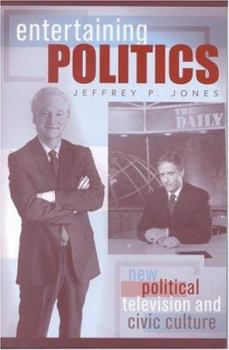Entertaining Politics: New Political Television and Civic Culture
Entertaining Politics examines humorous political talk shows on television—Politically Incorrect with Bill Maher, The Daily Show with Jon Stewart, and Dennis Miller Live. The book challenges the... This description may be from another edition of this product.
Format:Paperback
Language:English
ISBN:0742530884
ISBN13:9780742530881
Release Date:October 2004
Publisher:Rowman & Littlefield Publishers
Length:243 Pages
Weight:0.92 lbs.
Dimensions:0.6" x 6.5" x 9.0"
Customer Reviews
1 rating
Entertainment and Political Discourse
Published by Thriftbooks.com User , 19 years ago
Entertaining Politics: New Political Television and Civic Culture by Jeffrey P. Jones (Communication, Media, and Politics: Rowman & Littlefield) (Hardcover) examines humorous political talk shows on television-Politically Incorrect with Bill Maher, The Daily Show with Jon Stewart, and Dennis Miller Live. This book challenges the assumption that these shows have dumbed down politics, as well as the idea that television in general is a primary cause of civic disengagement. By investigating the production, content, and audiences for such programming, Jeffrey P. Jones contends that these shows provide important alternatives to traditional elite political and news sources. He shows how these comedic political commentators have revived political humor as an accessible and potent means of political critique in times of postmodern crisis. Bridging the fields of political communication and cultural studies, Entertaining Politics makes the case for how and why popular culture is an increasingly powerful force in shaping our civic culture-and why this may be a positive thing. Excerpt: When I first saw the program Politically Incorrect, I wasn't particularly en¬amored of it. I didn't disdain it like some of my colleagues; I was simply in¬trigued. Now here is something different, I thought, something that is overtly violating the implied rules of televised political talk. Although I never partic¬ularly enjoyed watching the Sunday morning talk shows or the shouting matches of the overly conservative hosts on cable television, they did define the standard. Here, though, was a comedian with a mullet discussing politics with the guy who played Batman on television when I was a kid. Say what? I, like other viewers, initially enjoyed seeing this odd mixture of celebrities from various public venues presented in a different light, hearing what they had to say and marveling at their intelligence, articulateness, or outright stu¬pidity. But, as I watched, what increasingly became clear to me was that this pro-gram was not operating under the same linguistic or epistemological guide-lines that I had come to accept as the normative ideal in discussing politics. Instead, it sounded like political discussions found in most every venue out-side of the institutions of television or the university-shortsighted, ahistori¬cal, laced with the latest media buzz, prone to diverting comments, and gen¬erally dependent on the "truths" offered by personal experiences. It also was refreshingly honest, impassioned, diverse, stimulating, witty, and smartly commonsensical when push came to shove. Indeed, the prevalence of com¬mon sense as the primary means for thinking through and arguing political issues is what hooked me intellectually. I had previously studied Rush Lim¬baugh and his claim to commonsense thinking in the populist early 1990s, but his talk never seemed very commonsensical to me-it was just mean-spirited bigotry driven by fear. As I began to watch, listen to, and study





